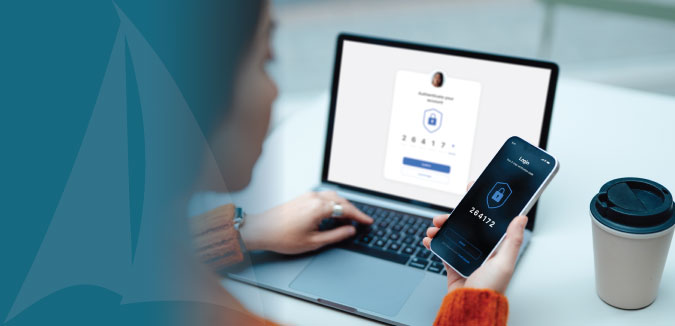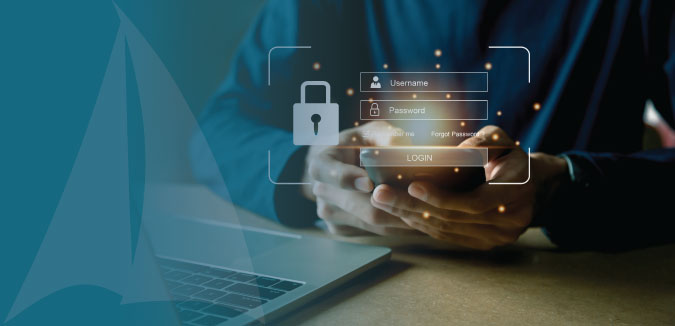featured
2025-03-31
Fraud
published
5 Minutes
In today’s digital world, cybersecurity is more critical than ever. With hackers constantly evolving their tactics, even small mistakes can leave your personal and financial information at risk.
Most of us have had a first-hand experience with a fraudster, whether successful or not, who attempted to steal our information in some way, shape or form. Maybe they used a social engineering tactic via text or social media, or maybe received a fraudulent link via email, etc.
While these attacks are extremely common, many folks continue to make careless mistakes when protecting their information, usually for simple reasons that don’t necessarily provide justification for taking the risk.
One of the most valuable assets to protect is your banking information, as falling victim to a cyberattack can lead to devastating financial losses.
So, let’s take a look at ten common cybersecurity mistakes you should avoid to keep your data safe.
1. Using Weak or Reused Passwords
It’s shocking how many people still use weak passwords like "123456" or "password," and worse, reuse them across multiple accounts. If a hacker gains access to one account, they can potentially access all your accounts, including banking and credit card accounts.
Use strong, unique passwords containing a combination of numbers, letters and symbols for each account and consider a password manager to keep track of them. Your name, family members names, favorite sports teams, etc. are NOT considered strong passwords. When it comes to passwords, the longer the better. Try to make your password at least 16 characters. Choosing 3 or 4 random words can help you achieve this and yes, the spaces count as characters!
2. Ignoring Two-Factor Authentication (2FA)
Two-Factor Authentication (2FA) adds an extra layer of security by requiring a second form of verification, like a text message code or authentication app. Many people ignore or disable 2FA because they find it inconvenient, but this is the single best step you can take to secure your accounts since it can prevent hackers from accessing your accounts even if they steal your password. Taking this extra small step can save your financial livelihood – we can’t stress this enough.
3. Clicking on Suspicious Links
Phishing emails and fake websites are designed to trick you into providing personal information. These links often look like they come from legitimate sources, including your bank. Always verify the sender by using previously obtained contact information (never using the information provided in the suspicious email) before clicking on links and visit websites by typing the URL directly into your browser.
4. Failing to Update Software and Devices
Outdated software is a goldmine for cybercriminals. Updates often include security patches that protect against newly discovered threats. Make sure to regularly update your operating system, apps, and antivirus software to keep cyber threats at bay.
5. Using Public Wi-Fi Without Protection
Public Wi-Fi networks are often unsecured, making it easy for hackers to intercept your data. If you must use public Wi-Fi, avoid logging into banking accounts or making financial transactions. Use a Virtual Private Network (VPN) to encrypt your data when browsing on public networks.
6. Oversharing Personal Information Online
Posting personal details like your birthday, address, or even vacation plans on social media can give hackers valuable clues for security questions or scams. Think about those mass-shared social posts that seem like fun games:
“Your name in your previous life was the street you grew up on and your mother’s maiden name – post your answer in the comments below."
Those type of questions seem like fun, but in responding in the comments section, you just provided hackers with 2 answers to potential security questions asked when resetting passwords. Be mindful of what you share online and adjust your privacy settings to limit access to your personal information.
BEWARE OF TRAVEL SCAMS – FINANCIAL SAFE & SECURE VACATIONING
7. Not Monitoring Bank Statements and Credit Reports
Many people only check their bank accounts when making a purchase. Regularly reviewing your bank statements and credit reports helps detect fraudulent transactions early. Setting up alerts for unusual account activity can also add an extra layer of protection.
STEPS TO TAKE IF THERE’S UNAUTHORIZED ACTIVITY ON MY ACCOUNT
8. Falling for Fake Tech Support or Service Scams
Scammers often pose as representatives from Microsoft, Apple, or your bank, claiming that your computer has a virus or security issue. They’ll ask for remote access or payment to "fix" the problem. Similarly, many fraudsters posing as service or utility companies will call stating bill payment is overdue and services will be shut off without immediate payment.
These scams rely on urgency and fear to get victims to let down their guard. Keep in mind, legitimate companies will never call you out of the blue—if you receive an unsolicited tech support call or threatening call regarding service or utilities, hang up immediately. You can call the utility or service company’s phone number printed on a previously obtained invoice for verification.
THE DETRIMENTAL DANGERS OF WIRE FRAUD
9. Using the Same Email for Everything
If you use the same email for your banking, social media, and shopping accounts, a single data breach can compromise everything. Consider using separate email addresses for different types of accounts, particularly for banking and financial services. Also, don’t use a work or business email account for personal purposes. That way, when you get that email at work claiming to be Netflix, or you get an email in your personal account about something work related, you’ll be able to quickly determine that it’s not legitimate.
10. Neglecting to Back Up Important Data
Ransomware attacks can lock you out of your own files, demanding payment to regain access. Regularly back up important files to an external hard drive or cloud storage so you don’t lose valuable information in case of an attack.
Final Thoughts
Cybersecurity isn’t just about protecting your data—it’s about safeguarding your financial future. Cybercriminals are always looking for ways to steal banking information and personal details, so staying vigilant is essential. By avoiding these common mistakes and taking proactive steps to secure your digital life, you can significantly reduce the risk of cyber threats.
Take cybersecurity seriously—your financial security depends on it.





